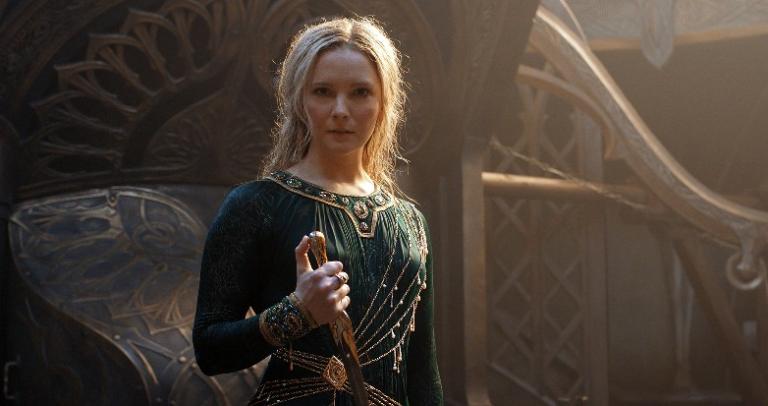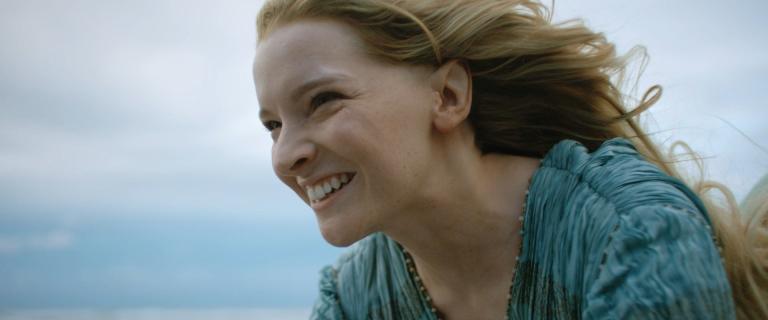
I’m not the sort to do episode-by-episode recaps or hot takes, so I’ve been faithfully watching Amazon’s The Lord of the Rings: The Rings of Power and have taken some time to think before writing about the show as a whole.
My conclusion? If it ain’t on the page, it ain’t on the stage.
Also, TV series are not movies cut into hour-long chunks. Episodic TV is a creature of its own, and if you don’t respect the creature, it will eat you. More on that in a bit.
The Lord of the Rings: The Rings of Power Is Tolkien Fan-Fic — But Does It Work as That?
As I said before, I’m no Tolkien aficionado. Other than The Hobbit, which I read in college and didn’t like, I haven’t gone into the books. But, I have seen all the movies (extended versions, too, with subtitles), along with much Googling and watching ‘splainer videos. So, no expert but not entirely ignorant, either.
Is The Lord of the Rings: The Rings of Power (hereinafter referred to as LOTR:ROP) Tolkien-esque enough? Doesn’t appear to be, so I just think of it as Tolkien-adjacent fanfic. Taken in that light, does it hold up on its own merits as a TV drama?
Uh. Well. Uh. Kinda, but also, no.
What I Liked and Didn’t About LOTR:ROP
The series looks fabulous. You can definitely see where they spent their money (other than obviously skimping on hot baths and laundry days for the grubby, probably lice-infested Harfoots. And they have Irish accents! Isn’t that special.)
The casting is OK. For the most part, the acting runs from competent to pretty good. My favorite actor is Ismael Cruz Córdova, who plays the elf Arondir. He has striking looks, a lovely warmth about him in this role, and does a mean action sequence. This guy has a future.
Least favorite is Morfyyd Clark as Galadriel. As I said at the beginning, either physically or emotionally, she doesn’t sell the whole Galadriel Warrior Princess thing to me at all.
She barely opens her mouth to speak (thank the Lord for subtitles), and her facial expressions run the gamut from annoyed to pissed off (aside from one slow-motion toothy grin while galloping a horse, which still haunts my dreams.)

But, in Clark’s defense, an actor is dependent on the script and the director. I know for sure the script didn’t serve her, and I suspect a lot of the more irritating aspects of the character are just what the director told her to do.
And we finally got some really stellar-looking horses (not the one/s that play/s Berek, easily the plainest pony of the bunch), and good equine action always lifts my spirits.

The Biggest Problem Is the Writing
Ultimately, where this series falls down is on the page. I don’t know much about showrunners J.D. Payne (who, BTW, is a member of the Church of Jesus Christ of Latter-day Saints) and Patrick McKay — and that’s true for most people.
The childhood pals have barely any onscreen credits but do appear to be Tolkien nerds. My guess is that worked in their favor, along with being young enough to survive the production process, and not so famous or influential as they’d cause any trouble.
Also, I wouldn’t be surprised if their salaries, while no doubt considerable, didn’t put a giant chink in an already gargantuan budget.
They just don’t know how to write TV.
And I say that as someone who spent 20-plus years writing about TV for a living, visiting many sets and locations, talking to endless on-camera and behind-the-scenes people, and watching more TV than any sane human being should.
As I said up top, they seem to think that a TV series is merely a very long movie, cut into one-hour segments. It is not.
That’s especially true when you’re not dropping the whole series to be binged in a weekend, but instead rolling it out one episode a week.
Season one of LOTR:ROP was a selection of parallel but unconnected storylines, running on for hour after hour, before finally intersecting (or at least, some of them did), essentially in the last two hours — provided people stuck around that long and didn’t just flip channels.
People are kind of trapped in a movie theater. They bought tickets, secured parking and popcorn, maybe a babysitter and have settled into a seat in a dark room with a giant screen. The movie will have to really suck for them to abandon all that partway through.
Abandoning a TV show requires just the push of a button.
That is why each episode of a proper TV series should have an arc of its own, with a distinct theme and some form of satisfying closure at the end. Even a good serialized show will do that.
Consider The Crown
Take, for example, Netflix’s The Crown, created by Peter Morgan. It’s a serialized show about Queen Elizabeth II, covering many decades. Like Doctor Who, it even periodically recasts its lead character (or, in this case, all of them).
But, each episode is truly an episode — a specific moment in time that explores the characters and the show’s larger themes, weaving multiple storylines into a cohesive whole that still moves the larger story along.
That’s how you do that. And that’s adamantly not how Payne and McKay have structured LOTR:ROP.
On top of this, there have been inconsistent and confusing character arcs and motivations. I can’t honestly outline these better than British YouTuber Disparu, who hilariously dissects the contradictions and confusions of each installment.
If you have an hour and need a laugh, recommend his spit-worthy take on the finale:
What Do You Do With a Problem Like Galadriel?
Suffice to say, pinning the whole series on the character of the elf Galadriel, while understandable from a fan-recognition point of view, was a huge mistake and, on top of that, poorly executed.
At no point does she act like a creature who’s been around for centuries and seen it all. In one scene, she reminds another character of his teenage kids.
She’s self-righteous, willfully blind, reckless, ruthless, diplomatically clueless, humorless and often just plain rude.
Making an immortal elf your main character is bad enough. How would she have enough flaws and quirks to make her relatable to ordinary mortal viewers? But if you give her all those flaws and quirks, then she doesn’t seem much like an immortal elf.
Also, we know she won’t die — because she’s in the movies. So, poof go your stakes for that character.
I so wish she’d just go away. But, she won’t. And, I also wish people would stop saying her name in an exaggerated way and rolling the r in it. Nobody does that for Elrond.
Is LOTR:ROP the Worst Thing Ever?
All this being said, the show isn’t terrible. It’s dopey, slow and badly structured, but it’s not terrible (and, as I said, it’s a visual feast). By the end, I began to get a sense of where they’re going with all this, and some of the ideas are intriguing.
For example, I’ve always thought the weakest element of Tolkien’s storytelling was making most of his heroes’ foes grotesque, misshapen monsters — whether orcs or Uruk-hai or trolls — that could be slaughtered without hesitation or compunction. Occasionally, in the movies, they get to be comic relief, but there’s no sense that their lives have any worth.
In LOTR:ROP, the mutilated elf Adar (Joseph Mawle), who leads an army of orcs, looks upon them not as disposable slaves but as fellow beings. He even makes the case that they are part of a Supreme Being’s creation, just like elves. But, Galadriel is having none of that and vows to wipe them all out anyway.
What I liked best was the overt inclusion of references to a higher power that guides our destinies. That’s closer than even the Catholic J.R.R. Tolkien got to visible religiosity in the fictional universe he created. I’m not sure where it’s all going, but it’s a nice addition.
Can LOTR:ROP Be Redeemed?
So, how to save LOTR:ROP from itself? I’m just a humble entertainment journalist, but from my experience, I recommend going out immediately and hiring the best, most experienced TV showrunner available and putting him or her over Payne and McKay.
This ship definitely lacks a rudder, but it mostly lacks a captain who knows how to steer over the waves and around the rocks.
Payne and McKay may be the Frodo and Sam of their own story, but even the Hobbits needed an Aragorn and a Gandalf to show them the way.
Join YouTuber Nerd of the Rings for a non-snarky deep dive into the finale details:
Images: Courtesy of Prime Video. Copyright: Amazon Studios
Don’t miss a thing: Subscribe to all that I write at Authory.com/KateOHare














